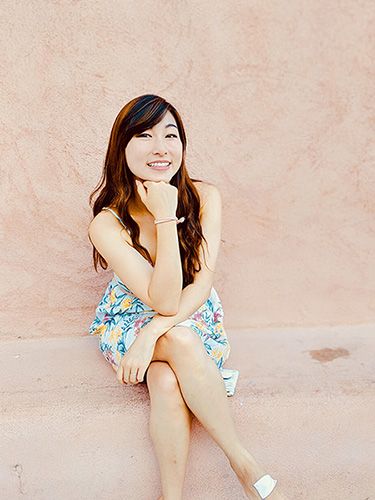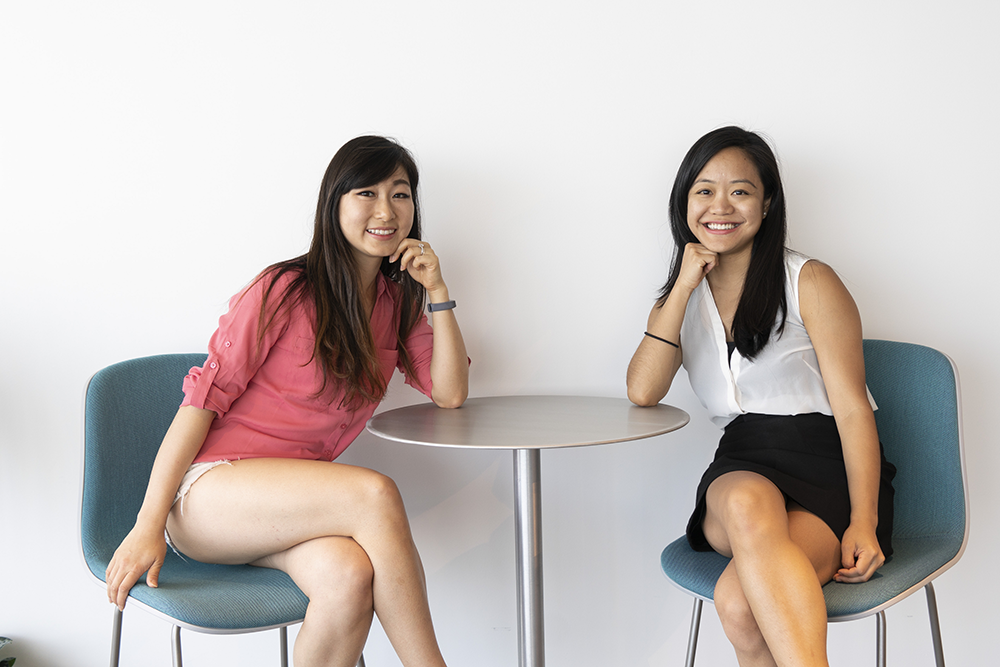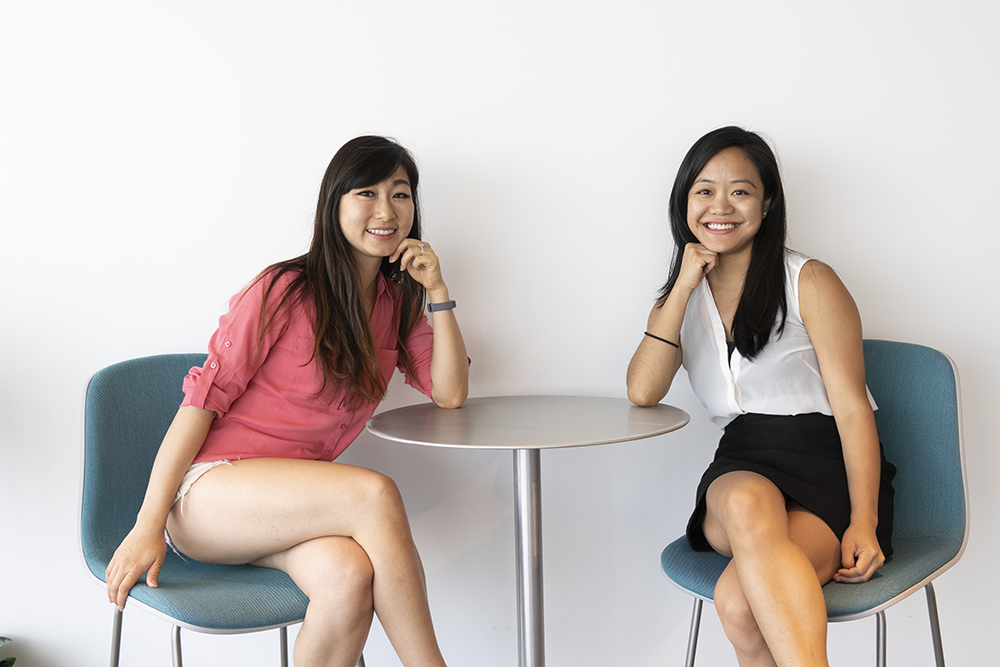Lucia Liu is the founder and co-host of Rock the Boat, a narrative podcast featuring conversations with Asian-Americans who have challenged the status quo. Past guests on her podcast include Andrew Yang, Michelle Phan, and Bing Chen among many others. She is also a startup advisor and a luxury chocolatier. Lucia graduated from Penn in 2010 after studying communications with a minor in consumer psychology.

A Zigzag Journey from Penn
I was looking at the Rock the Boat website and noticed that you and your co-host Lynne both had very zigzag career journeys. Could tell us a little bit more about your zigzag journey starting from Penn and ending where you are today?
So, I majored in communications at Penn - I was in the Annenberg School, but I also did a consumer psychology minor, which was pretty much a half-marketing degree and a half-psychology degree. I've always been really interested in psyche and learning about how and why people worked the certain ways that they did. Communications at Annenberg was about how people interacted with media, so there was a lot of psychology in my underlying studies. I was also really interested in business; at one point I was thinking about transitioning over to the business school, but I never did. So I ended up taking marketing classes instead and really fell in love with the concept of just understanding how people operated and why they bought the things that they did.
I'd always thought that growing up, my parents were pretty relaxed. They aren't tiger parents; they never really expected a lot from me. I went to 14 different schools before high school, and I lived in six different states. My parents decided that they wanted to move back to Shanghai right before I started high school, so we moved to Shanghai and my dad started his own startup. He couldn't really afford to have me go to international school, so I went and audited a Chinese class at a Chinese local school. I have no ninth grade transcript, so from an anti-resume project perspective, I actually have a GED. After that one year of local school, I was accepted into an international baccalaureate school in Shanghai. So the funny thing is, I have an International Baccalaureate plus a GED.
After I graduated from Penn, I ended up working at American Express. I did their junior year internship program, and they brought me back on full time. I worked there for two years as a marketing analyst, and then I was quickly promoted to a different division within the company in business travel doing product management. I was actually managing my first digital products, which was fairly unique at the time. That gave me a slight taste of technology as well as project management, managing a ton of different stakeholders, and working internationally. It was the first time that I got to work within a big company at a global capacity, and I learned a ton from it. But I started to feel like I was not growing or building the skillset that I really wanted to build.
I was at a crossroads where I could either go on to business school, start my own business, or work at a smaller company. The reason why I made the decision to start my own company was because Obamacare happened, so my employment was no longer tied to healthcare. And the second thing was that Squarespace happened: I could make my own website without knowing a lick of code. So I figured, “Hey, this is cool, why don't I try to start my own thing?” I’d always enjoyed just tinkering in the kitchen, so one of the things that I learned how to do was make chocolates off of YouTube videos. I thought, “Okay, so there are certain flavors that I want to showcase. I want to be able to bring it back to my heritage and showcase Asian flavors. I know marketing because I've done marketing at Amex. I know how to build a site because I’ve built internal websites at Amex. I'm sure I can figure out how to sell this product.”
I ended up applying for Smorgasburg. They asked for me to join a contest from which they would choose a chocolate vendor. It was one of the marketing promotions that they were doing. So I took my two products that I had made the night before. All my friends came over; we were packing chocolate till 4:00 a.m. and then I lugged a table, a little sign that I made, some string lights, and a tablecloth. And that was my setup. Some of the other people who were competing were established businesses in upstate New York or New York City, and I was like, “How am I going to compete with these different people?” But a lot of my friends showed up, and a lot of people actually really enjoyed my chocolates, so they all voted for my chocolates. And I ended up winning the contest and got a permanent booth at Smorgasburg.
From there I got a lot of different opportunities in the luxury field. I went back to Amex and said “Hey, I know you guys have Centurion Lounges - can I cater for them?” A lot of people also reached out to me for wedding chocolates. I also had a partnership agreement with the Park Hyatt, so I was offering chocolates at the spa. I did that for about two years. Everything was out of pocket. I was still very young. I was about 25 at the time and didn't really know a ton about development or how to run a company. I had a really hard time finding a co-founder; being in a startup wasn't as sexy back then I'd say it is now. I just didn't have that kind of support network around me to help me grow the business, so I figured I needed to go back and learn more.
So I scaled the business down and started consulting and got a real estate license. I worked for a real estate company for a hot second and then ended up consulting for another real estate company. That was a little different from traditional real estate. They were more of a startup and a lead generation engine. I joined them and became Employee Number One. I was chief of staff to the CEO, and we grew the team to about 20 people before I left. I helped him with everything: I helped him with business development, I helped him set up the company structure, I helped him with all of recruiting, I built out a marketing team and did all that and decided, “Hey, this is cool, startups seem cool, I want to join like a legitimate VC-backed startup.”
It was at that time when this VC-backed startup actually reached out to me, and I interviewed with them, and they hired me. So I went to be Chief of Staff at that VC-backed company; lo and behold, it was a very different experience. The company itself was tasked to grow very fast. The leadership team didn't really have a lot of experience. They weren’t young per se; it's just that they didn't have a lot of business experience. I'm thinking about creating a website called Post-Traumatic Startup Disorder to tell stories about things that happened at that time. That wasn't a great experience for me, so I decided to leave after I clocked in a year.
Since then, I've launched Rock the Boat, which is the podcast that I've been working on with Lynne for the past two years. I'm also doing some consulting work, and I'm incubating an idea right now, which might be related to food and some sort of accelerator. So we'll see, I think I'm just kind of taking it as it goes right now.
Becoming an Entrepreneur
It seems like you’ve gone on a very long journey since Penn. Do you think your dad really influenced you in deciding to become an entrepreneur later on? Did your experiences at Penn push you towards that direction as well?
I would actually say my dad did not influence my desire to be an entrepreneur. I don't know if it's genetic at all - that I cannot guarantee. But my dad for most of his life was not an entrepreneur. Unlike a lot of Asian Americans, our family never owned businesses, so we never have a restaurant business or a deli or anything that a lot of other Asian families have experienced. My parents are full-on engineers. My mom’s an engineer, my dad’s an engineer, so they were always very academically focused. They'd always wanted me to take a stable career and do something that was less strenuous. I don't really know where I got the entrepreneurial bug. I would say it’s a mixture of a lot of different things. For one, I was in the Small Business Division at Amex, so I got to see a lot of small businesses working towards something. I think the second piece is that at Penn, I was part of a lot of different organizations, and I enjoyed organizing people around things.
I didn't really think I would be a full-on entrepreneur but I think now, looking back and connecting all the dots, I just really enjoy owning things. It's important for me to own the things that I work on. It's important for me to be able to have flexibility and create my own schedule.
I can tell you 100 percent I'm not doing it for the money because I could be making a lot more money in corporate. But I'm doing it for the flexibility and for the fact that at the end of the day, I am trying to work for myself to create something that I want to create.
Making the Right Decision
It must have been a really scary decision to switch from a job at Amex to becoming an entrepreneur and selling chocolates. At what moment were you convinced that it was the right decision to make?
Throughout the chocolate experience, I don't know if I ever thought it was the right decision to make because throughout the entire journey and experience, my mom was like, “Why did you quit your job? Why are you doing this? Why can't you do something that’s a little easier for you?” There was always a lot of questioning as to why I had to do it. I think for me the reason why I thought I had to do it was because I just didn't feel like I was getting the type of experience that I wanted in a large corporation. I also didn’t feel like I wanted to wait for permission in order to learn something, and one of the things that I've always wanted to learn was how to efficiently and appropriately run a business. Did that chocolate experience fully teach me how to run a business? Probably not, but I think it did help me understand what it takes to run a business and the things that I had to do right. I also think that it absolutely allowed for me to become a much more hands-on person. If I’d stayed at Amex, I feel like I wouldn't have ever learned how to tactically do things. When you’re at a big company, you have all these resources, you have all these are the people that you're working with; day to day, you're really just managing people and expectations.
But when you run a company or you do your own thing, you’re doing hand-to-hand combat every single day, trying to figure out what works and what doesn’t work in a very practical manner.
So to me, it feels like that’s something I had to learn. Could I have done it another way? Possibly. Is this the absolute right decision that I made? I don't know. The jury’s still out. But I think because of it, I feel like I've become a more complete and rounded person. Whenever I meet somebody and I tell them, “Oh, I’m a chocolatier,” their eyes light up, and they’re like, “Whoa, that’s so cool!” So I think from a life experience perspective, it was awesome.
Read on for Part 2 on Lucia's experience as an Asian-American entrepreneur and advice for creating your own startup.
Header photo courtesy of Anchor's interview with Lucia Liu and Lynne Guey


